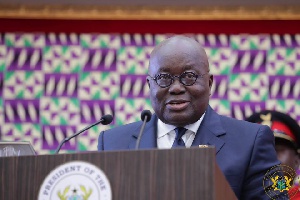President Akufo-Addo has charged the Forestry Commission and the Ghana Cocobod to ensure that they join forces through the Ghana Cocoa Forest REDD+ Programme to make the country’s cocoa sector climate-resilient.
This call he made when he delivered the keynote address at the launch of the Ghana Cocoa Forest REDD+ Programme (GCFRP) on the theme; “Achieving 10 Million Tonnes Emission Reduction in Six Years”.
The objective of the GCFRP is to significantly reduce carbon emissions resulting from cocoa expansion into forests through the promotion of appropriate climate-smart cocoa production approaches, including intensification and yield enhancement. The programme also seeks to curb illegal timber harvesting and mining, while incorporating shade trees in cocoa systems and to build climate – resilience for the cocoa sector in order to secure rural livelihoods and sustain national development.
“The Ghana Cocoa Forest REDD+ Programme (GCFRP) has the capacity to further our economy, restore our forest cover, reduce meaningfully our greenhouse gases, boost cocoa production, and also increase the tourism potential of our country” President Akufo Addo observed in his address. “As co-chair of the UN eminent group of advocates of the SDGs, u am aware that the implementation of GCFRP is crucial. I, therefore, call on all stakeholders to rise to the occasion. This is the time to exhibit real ambition through action. The GCFRP is a performance-based programmme and we need results in the form of verifiable emission reductions”.
CEO of Forestry Commission
Chief Executive Officer of the Forestry Commission, Kwadwo Owusu Afriyie in his address, indicated that Ghana is the third country globally to subscribe to the carbon funds portfolio.
“Per the terms and conditions 9f this agreement, Ghana shall be advanced an amount of 1.3 million US dollars to Kickstart some of the activities in the programme document” the Forestry Commission Chief Executive Kwadwo Owusu Afriyie said.
Background
Ghana’s Cocoa Forest landscape has one of the alarming deforestation rates in Africa. Forest degradation and deforestation across this agro-forest mosaic, which covers 5.9 million hectares of Ghana’s High Forest Zone is being driven by continued agricultural expansion and other types of agriculture (food crops farming), coupled with a recent upsurge in illegal mining and illegal logging.
For much of this time, conversion of forests was not viewed as a problem, but by the mid-nineties, it was clear that Ghana’s forest reserves were moderate to severely degraded, low-to-no shade cocoa was expanding at the expense of forests and trees, and biodiversity in the landscape had declined precipitously.
Concurrent with the loss of forests, Ghana's Cocoa Board and the cocoa private sector also recognized that the country was underperforming in terms of national production, despite the growing land area under cocoa.
By tackling the drivers of deforestation and degradation, Ghana aims to secure the future of its forests and make the cocoa sector climate-resilience, whilst sustaining and enhancing incomes and livelihood opportunities for farmers and forest users across the programme area.
Business News of Saturday, 5 October 2019
Source: starrfm.com.gh
Make cocoa sector climate-resilient – Akufo-Addo to COCOBOD
Entertainment












